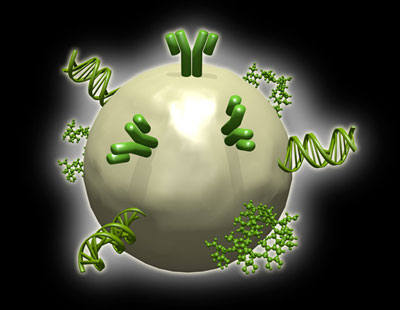| Posted: Sep 15, 2011 | |
Gold nuggets for biotechnology: Introducing laser-generated nanoparticle conjugates |
|
| (Nanowerk Application Note) Bio-conjugated nanoparticles are important analytical tools with emerging biological and medical applications. Especially gold nanoparticles are of increasing interest for nanobiotechnology research and applications because of their high acceptance level in living systems and the fact that they are fairly easily conjugated with functional molecules. | |
| In this context, in situ conjugation of nanoparticles with biomolecules via laser ablation in an aqueous media is a highly promising one-step method for the production of functional nanoparticles resulting in highly efficient conjugation (see "Laser ablation-based one-step generation and bio-functionalization of gold nanoparticles conjugated with aptamers" in Journal of Nanobiotechnolog). | |
| Ultrashort pulsed laser ablation represents a powerful tool for the generation of pure gold nanoparticles avoiding chemical precursors, reducing agents, and stabilizing ligands. The bare surface of the charged nanoparticles makes them highly available for functionalization and as a result especially interesting for biomedical applications (see "Conjugation Efficiency of Laser-Based Bioconjugation of Gold Nanoparticles with Nucleic Acids" in Journal of Physical Chemistry C). | |
| Starting today, such conjugates are available commercially for the first time. | |
| Particular GmbH from Germany now uses a laser method to produce gold nanoparticles with high purity and conjugate them with high efficiency – in amounts on the milliliter scale. | |
| Gold nanoparticles can be conjugated with biological molecules and have special optical properties that allow to detect and characterize them. While toxic dyes are still predominant in most biotech labs, gold is especially interesting when results shall be transferred to living cells and tissue, as small amounts of gold do not cause adverse effects in organisms. | |
 |
|
| Illustration of a conjugated gold nanoparticle. (Image: Particular GmbH) | |
| The gold particles from Particular have a diameter in the range of 10 nm. They can be conjugated with functional molecules, such as cell-penetrating peptides or DNA. Gold does not only visualize these molecules, but can also interconnect them as a universal linker. This will, for example, allow biologists to transport their substances through cell membranes and link them with nucleic acids, helping them to detect or defeat diseases. | |
| Now, Particular GmbH is launching new gold nanoparticle conjugates that are, for the first time, generated by laser ablation from gold, which is not a chemical, but a physical process. It makes them unusually pure and, at the same time, cost-saving, while the particles' high surface activity helps to make use of the affinity between biomolecules and gold most efficiently. | |
| This new product series is introduced with the launch of a new catalogue today, September 15. | |
| Besides ligand-free nanoparticle dispersions from pure metals, Particular now offers gold conjugates with oligonucleotides, peptides, and antibodies, perfectly dispersed in several milliliters of water. With the functionality and yield of these conjugates, the company is utilizing "gold nuggets" to pave the way for new biotech applications. | |
| Source: Particular GmbH. Particular is a nanotechnology company from Hannover, Germany, that started their business as a nanomaterial supplier in July 2010. The start-up is the first company to employ laser ablation in liquids for the production of nanoparticles. The particles are pure and charged, and their liquid dispersion media ensure a high quality and good and secure processability. | |
|
Become a Spotlight guest author! Join our large and growing group of guest contributors. Have you just published a scientific paper or have other exciting developments to share with the nanotechnology community? Here is how to publish on nanowerk.com. |
|
